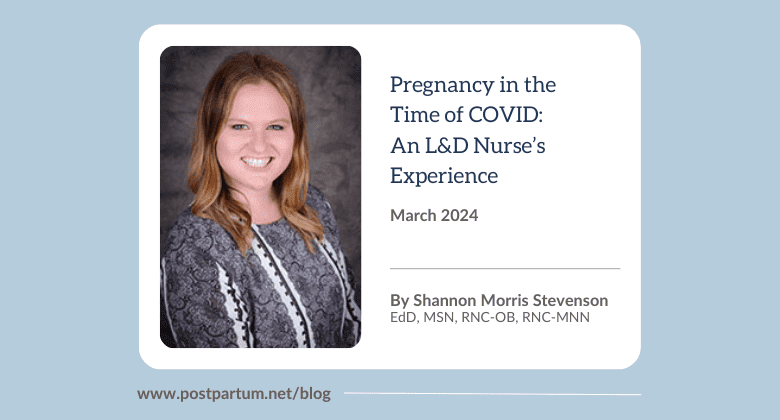Pregnancy in the Time of COVID: An L&D Nurse’s Experience

When you spend your entire career caring for pregnant patients and newborns, there is an expectation, both in yourself and from others, that the transition to motherhood will be easy. I know what to expect, from a medical standpoint, from pregnancy to delivery. I cared for hundreds of families for nearly a decade before I saw those two pink lines on my own pregnancy test. The intrusive thoughts started soon after. I’ve never been diagnosed with an anxiety disorder, but the overwhelming waves of “What if something goes wrong? What if I cause something to go wrong?” fell on me hard in the first few weeks. I hid it from everyone except my husband, who had to talk me out of irrational fears about everything from handling dishwasher detergent (the chemicals!) I knew he was worried about me, and I hid from him the all my innermost fears. He is not a therapist or a mental health professional; he is in accounting.
When we got a perfectly healthy report from my 20-week anatomy scan, I started to relax a little. Physically, our baby is doing well. I was close to the 24-week viability line and finally felt like things were going to be okay. I can do it! It was mid-February 2020. I don’t need to tell you what was dominating the news just a few weeks later. I always wondered what my birth would be like. Our parents will be in the waiting room, my L&D coworkers will come in to visit, and we’ll greet guests and pass our sweet girl around the room. Nothing happened. There was no baby shower where I opened little onesies and blankets. There was no family to help while we learned how to care for this little guy. I didn’t know how much I needed my own mother until I became one. It is soul-crushingly sad. I started to feel the darkness and anxiety creep in again as we spent more time alone. I vividly remember taking our daughter to her first pediatrician appointment by myself. My husband was not allowed to join us. I waddled into the building, baby and I both in diapers and tried to listen to what the pediatrician was telling me about my jaundiced baby. I had to meet with lactation consultants on FaceTime, trying to balance my phone and a nursing newborn at the same time. I just want to scream most days: “This isn’t how it’s supposed to be!” I loved my little girl, but I felt empty for so long.
Gradually, our daughter got older, and we were able to mitigate our COVID risks as much as we could to find a new normal. We finally introduced him to our families. We drove 16 hours from Houston to Atlanta so my family could meet our girl. We left Texas to move back to Georgia to be closer to my family. Our daughter is almost 4 years old now and is the most energetic wild child that has never met a stranger. I work as a nursing professor, where I teach students about caring for families during pregnancy and the transition to parenthood. I serve on the Board of Directors for Healthy Mothers, Healthy Babies Coalition of Georgia, where I can pour my passion for improving maternal care into meaningful action that benefits families across the state. In that role, I was fortunate to partner with PSI on a statewide task force to address perinatal mental health needs in Georgia.
I’ll be honest, though; it still hurts for me to reflect on my pregnancy, birth, and the first year of my daughter’s life. What should have been joy is instead filled with anxiety, fear, and sadness. It’s hard for me to go to baby showers with family and friends or see pictures of families meeting newborns. I’m mourning what I’ve dreamed of for so long. The intrusive thoughts continued until I started working with a therapist who taught me about mindfulness and introduced me to cognitive behavioral therapy. Perinatal mental health care should be as routine as getting care for high blood pressure or gestational diabetes. I know so many families whose experiences are like mine, giving birth in the early days of the pandemic. Do they have help? Did they have access to professionals who could assess, diagnose, and treat mental health conditions? Do they suffer in silence, letting the waves of depression or anxiety roll in, relentlessly? I know what I’m going through is not normal, but I fought it for a long time because, as a maternal healthcare provider, shouldn’t I be able to handle it? I compare my experience of motherhood to swimming: with my background, everyone expected me to be an Olympian when in reality, I felt like I was just treading water. Mothers deserve more than that. Healthy mothers lead to healthy babies, which lead to healthy communities. It’s time we, as a society, offer life jackets to all who tread the water as they transition into parenthood, regardless of their educational training or professional experience.
Learn more about Anxiety
Ask for help
Professional Training and Education





